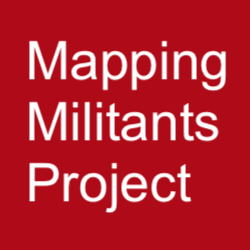General Background
The Mapping Militants Project (MMP) traces the evolution of violent militant or extremist organizations in specified conflict theatres and analyzes their interactions. It presents uniquely accessible and clear genealogical and network information. MMP provides (1) in-depth profiles of individual groups, complete with citations to sources, (2) interactive “maps,” or family trees, which are visual representations of how relationships among militant organizations change over time, and (3) diagrams of network relationships also showing change over time.
Project findings demonstrate how groups form, split, merge, collaborate, compete, shift ideological direction, adopt or renounce violence, grow, shrink, and decline or transform themselves over time. The MMP database of group profiles is available online as well as downloadable in PDF format. Other relationship data are downloadable in CSV files. The website is an invaluable resource to students, scholars, journalists, policy analysts, and others interested in violent oppositional organizations. Please see our Terms of Use, below.
From 2009 to 2012, MMP was funded by an award from the Social and Behavioral Dimensions of National Security, Conflict, and Cooperation competition, a joint venture between the National Science Foundation and the Department of Defense. From 2012 to 2019, the research was supported by Stanford University, including the Freeman Spogli Institute for International Studies Policy Implementation Lab as well as the Center for International Security and Cooperation (CISAC). In 2019, the project received funding from the National Counterterrorism, Innovation, Technology, and Education Center (NCITE), a U.S. Department of Homeland Security Center of Excellence based at the University of Nebraska, Omaha (Grant Award Number 20STTPC00001-03). The views and conclusions included on the website are those of the authors and should not be interpreted as necessarily representing the official policies, either expressed or implied, of the U.S. Department of Homeland Security or the U.S. Department of Defense. MMP was a collaborative project with The George Washington University 2019-2022. In 2023, Rice University joined the project. The project relies primarily on research assistance from undergraduate and graduate students.
Core Faculty and Researchers
The Mapping Militants Project has been overseen by Stanford CISAC-FSI Senior Fellow Emerita Martha Crenshaw since its inception in 2009. Iris Malone, former Assistant Professor at The George Washington University, co-directed the project 2019-2022. Kaitlyn Robinson, Assistant Professor at Rice University, has co-directed the project since 2023. Stanford Ph.D. candidates in Political Science have assisted with the oversight of the project and managed a team of graduate and undergraduate research assistants: Rachel Gillum, Kerry Persen, Iris Malone, and Kaitlyn Robinson. Stanford CISAC Postdoctoral Fellow Laura Courchesne assisted with the project in 2022-2023.
Martha Crenshaw
Senior Fellow at the Freeman Spogli Institute for International Studies (FSI), Emerita, and Professor, by courtesy, of Political Science, Emerita, at Stanford University; Professor of Government Emerita at Wesleyan University.
Martha Crenshaw is a senior fellow emerita at the FSI Center for International Security and Cooperation (CISAC) and a professor of political science by courtesy, emerita, at Stanford University. She taught in the Department of Government at Wesleyan University from 1974 to 2007. She has published extensively on the subject of terrorism. In 2011, Routledge published Explaining Terrorism, a collection of her previously published work. A book co-authored with Gary LaFree titled Countering Terrorism was published by the Brookings Institution Press in 2017.
Kaitlyn Robinson
Assistant Professor, Department of Political Science, Rice University.
Kaitlyn Robinson is an Assistant Professor of Political Science at Rice University. She received her Ph.D. in Political Science from Stanford University in 2022, and she was an America in the World Consortium Postdoctoral Fellow at Duke University from 2022-2023. Her research explores how international and organizational politics influence civil war and the formation and fragmentation of militant organizations.
